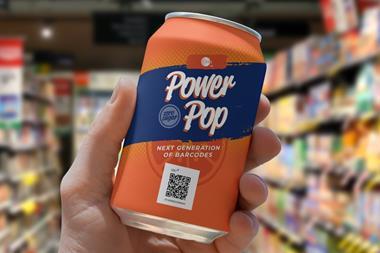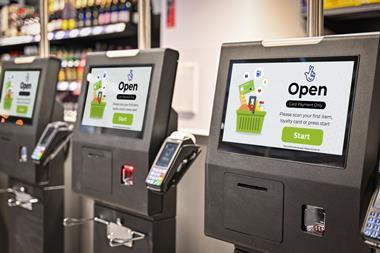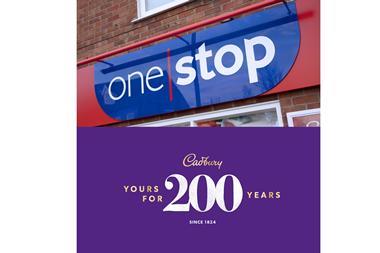Light-fingered staff are costing the sector millions, but sharper business practices and cash-handling technology can help minimise the risks
The thought of a member of your own team - the very people you say good morning to each day - stealing from you, sends shivers down the spine. But be it a case of cigarettes smuggled out of the stockroom, or a wad of twenties snatched from the till, staff theft is very much a reality.
There were a whopping 7,455 incidents of staff theft in the convenience sector last year, according to the Association of Convenience Store’s (ACS) annual crime report, which revealed that the total cost of staff theft to the sector was £19m in 2015.
The average staff theft incident costs retailers £1,686. This is 11 times more than the average shop theft incident, and suggests that many of the staff who steal from shop owners do so over a long period of time, claims the ACS.
“We’ve seen serious amounts of money stolen,” says James Loker, marketing manager at The Retail Data Partnership. “We see retailers with great turnover, but little profit because so many high-turnover goods are low margin. If you’re losing £5 a day that’s £150 a month, and if you’re only making £10,000 profit then it can have a huge impact on your business.”
Andy Pengelly of Costcutter Porthleven in Cornwall was the unfortunate victim of a series of till thefts, which grew in value as the thief became more confident.
The most common internal thefts
Cash directly from tills
Partial scanning of products
Price overrides
Lottery process
Consumption of products in store
Source: Association of Convenience Stores Voice of Local Shops Survey
“It had been going on for a while before we knew who it was and whether it was theft,” he says. “The amounts that should have been in the till were consistently out on particular days. The way we work means that you can’t have one person to one till, so we just had to narrow it down to particular days and particular staff members. I think it was £300 taken in the end.
“We were shocked because we’d never had it before; we almost couldn’t believe it. You know someone by first name and see them every day and then they go and do something like that.”
Vic Grewal of Simply Fresh, Thames Ditton, Surrey, is very matter of fact about staff theft. “You can’t trust anybody; you have to keep an eye on them,” he says. “I’ve had loads of staff theft. When you first realise, you get scared, but then you talk to other retailers and realise it happens to everyone.”
The staff in his former Flackwell Heath store had the audacity to work together to steal a total of £25,000-£30,000 of cigarettes and Vic didn’t find out until too late because the manager wasn’t doing a stocktake.
“A similar thing happened at Thames Ditton - I lost £13,000 in three months,” he says. “A staff member was activating a whole bundle of scratch cards, scratching them and then taking the pay-outs from the till. It was a double whammy!”
And it isn’t just cash and stock that can be stolen, Vic discovered. “In Flackwell Heath, I suddenly started receiving alerts from my broadband provider that I was going over my limit. I asked for an itemised bill - it turned out that even the manager was going on the internet for three hours a day - not doing work! You’re paying for someone to be sitting around and then you’re being charged for it!”
While Vic was obviously distraught about the incidents, he claims that they have taught him to sharpen his wits. “It makes you more alert,” he says.
He warns other retailers to run through their finances with a fine-tooth comb. “You need to keep an eye on your bills. When I do my VAT every quarter I compile a list of everything I’m giving to the accountant. I calculate the sales - how many scratch cards are activated on average. If you look at it statistically, the sales shouldn’t vary drastically. If they do then something is going wrong.
“I check all the banking statements every day online and I know exactly what the weekly bill should be so I’ll phone and question if it is above the usual amount. Sometimes it can just be the case that staff have ordered more product because it’s on promotion, but you have to make sure there is a good reason.
“When all of this is being done in-store it can go wrong. You need to check yourself - look at refunds and overrides - if slips are missing. You can’t leave someone else to look at it.”
Weymouth One Stop and Londis retailer Steve Bassett agrees that staying close to the business is crucial. “We have a lot of CCTV and we do regular stocktakes, but it’s also about using your senses - you know who your weak links are. I turn up unexpectedly sometimes - for example, if I’m on my way to London I’ll call in at 6am. It’s about being varied in your routine. If people think you’ll never turn up then they’ll try it on.”
He has also developed a clear cash audit trail. “Your cash handling process has to be pretty robust. You have to drill in the sense of checking everything. If you’re strict with delivery drivers, staff see that and they know they can’t afford to risk getting caught. I put checks into place that I only check once in a blue moon. But as long as staff think there is a process in place, they’ll stick to the rules.”
The Retail Data Partnership’s Loker concurs that introducing set procedures is a sure-fire way to discourage staff theft. “Epos is a good deterrent - not because it’s secure, but because the retailer knows what will be in the till at the end of the day,” he says.
“To reduce theft using your epos system, make sure that it is running consistently thoroughly throughout the working day. Employees who attempt to steal from your store will notice how the system is used and realise that they will be caught.”
Using epos also makes it easier to spot if money does go missing, notes Loker. “The trouble with shrinkage is that you can’t physically see it. If you’re either not using the epos system properly, or you don’t use epos, then there’s no way of knowing what you should have in the till. With our tills, each staff member has their own log-in, so you could go really deep and do a transaction finder if you wanted to be really thorough.”
He adds that a good epos system, such as ShopMate, can also help you manage stock, which makes it easier for you to detect theft. “It’s important to have accurate stock figures at all times, particularly high-value and easily-stolen products such as tobacco. It’s far too easy to forget, or simply not have time to track and manage all stock, making you a target.”
Dee Sedani, who owns two One Stop stores in Derbyshire, keeps his finger on the pulse. “It all starts with stock control,” he says. “If you don’t have that in place, you’ll never have a clue. Items such as cigarettes and spirits behind the counter are ones to watch.”
He also has processes in place to ensure that the business is running smoothly. “The more you do random spot checks the more staff are aware that you know what’s going on in the business.
“All my staff have to prove they’ve purchased an item. They print out a receipt, or a member of staff has to run it through for them, and there’s a box in the office where they file their receipts.”
Dee has found that cash handling technology can help to clamp down on staff theft, too. “With cash, staff need to reconcile the tills at every shift change. Mine is all done by robot - my Tidel system sucks every coin and note into a safe. Staff throw everything into a bucket and it is all automatically weighed up.
“I haven’t had staff stealing money, because everything is done through technology. Any time they cash up their till their discrepancy is logged. The machine dispenses a fresh float at the start of the shift.”
Andy in Cornwall is also making use of cash-handling technology. His store has been trialling Smarttills, which use the latest weighing technology to count all notes and coins automatically within seconds of the cash drawer being closed. “We now rely on the till to give us a report of what cash is in the drawer at the end of the day, whereas before we would take the inserts out and replace them with a spare set so that we could take the till away and count it up.
“It makes a significant saving in time and I’m sure it acts as a deterrent for staff theft. If it did cross anyone’s mind to take something, I’m sure they’d think twice about it now. I’d be surprised if anyone is foolish enough to take money from the tills, because you can pin it down to the second what notes and coins are put in the till.”
The Smarttill is currently being rolled out to Costcutter’s 2,600 stores across the UK.
Technology is proving the way forward for Raj Aggarwal, who owns three Spar stores in Leicestershire. He notes that cash theft is harder to spot than product theft, but his new ValiDator safe from FBH Security Equipment has the potential to greatly reduce staff shrinkage.
“We have a float per till and then each member of staff has their own pin code for our ValiDator safe. We used to put the money in a pod, which went down a chute into a safe room where it was collected by a supervisor, opened and unravelled, and then counted.”
But the new safe has removed the need for staff to re-count the money. “With the safe, staff are given receipts for their deposits so you know how much money has gone into the safe. It’s very rare that money goes missing because the staff know that the cash is traceable and that we have CCTV. Precaution is key.”
Steve has also embraced new technology. “We are installing a Linc Safe machine from Arca, which counts notes as you go. This eliminates the need for double handling from the store managers’ perspective. It’s similar to what Wilkos use - a counter cash machine which is electronic - you feed money in and it knows who’s done it.”
There is a major opportunity for retailers to benefit from cash-handling technology, according to Fearghal McAdam, UK business development director for Arca. “The UK is the third largest retail market in the world, but in terms of cash-handling technology it is embryonic. We know top-tier retailers who haven’t changed their cash handling since the 1920s!”
He concedes that movement of cash through the business is not always a top priority. “With retailers, their main focus is selling product, knowing how to pique the interest of the customer, laying out the store, and offering great service. The money is secondary - retailers look at how much they sold and sales comparisons, but do they look at what they banked? Cash is something that needs to be carefully managed.”
He claims that introducing cash-handling technology into your business can have an immediate impact on staff members’ attitudes towards internal theft. “We are seeing a 50% reduction in shrinkage when retailers use our cash-handling equipment,” he says. “There’s a psychological effect on staff - when they see new technology, they think: ‘Something’s going on here - we’d better be more careful’. When you have a safe connected to the internet and real time, you can see that Mary put a tenner in till one at 10am. Staff realise that they are being watched.”
Whether you choose to invest in cash-handling technology, make better use of your epos system, or simply start monitoring your cash and products more carefully, making staff aware that you are on the ball is half the battle. Says McAdam: “Staff theft is the elephant in the room. Retailers know it is going on, but it’s so easy to implement simple measures that will make people realise that they are being monitored.”
Top tips
How to identify staff theft
Monitor till processes carefully and review individual end-of-day reports
Use till overlay systems to allow CCTV to combine with ‘real-time’ till receipt images
Monitor voids and refunds transactions closely
Analyse till, cash management and inventory data to identify trends - look for anything out of the ordinary
When carrying out internal theft investigations, ensure you establish how and why the offence happened. This enables you to tackle the motive and presents an opportunity to prevent future incidents
Report incidents to the police using the 101 number
Source: Association of Convenience Stores Crime Report 2016
How to reduce internal theft
Carry out regular stock checks
Enter all incoming stock into your epos software. Include the quantity received to ensure that the current quantity in your store is accurate
Scan-out all stock that is returned to the supplier for any reason, including damaged and out-of-date items
Sell items by scanning the barcode! Too often items are sold using department keys and therefore the retailer is not tracking each item sold. Avoid using department and hotkeys and use a staff log-in which enables you to track which employee sold what, and how much they sold during their shift
Re-order stock using the re-order report on your system. You can enter a minimum stock quantity as a guide for the software to reorder to. This process highlights stock discrepancies.
Source: The Retail Data Partnership
Develop an anti-theft culture
Use your financial summary report regularly to develop an understanding of the money that goes through your business. If this suddenly changes, then it’s time to ask a few questions.
Train all your employees on theft-prevention techniques so that they can spot suspicious behaviour
Encourage staff to make anonymous tip-offs by leaving a phone number on which to leave a message if they suspect a co-worker is stealing
Visit your store without warning.
Source: The Retail Data Partnership






















No comments yet